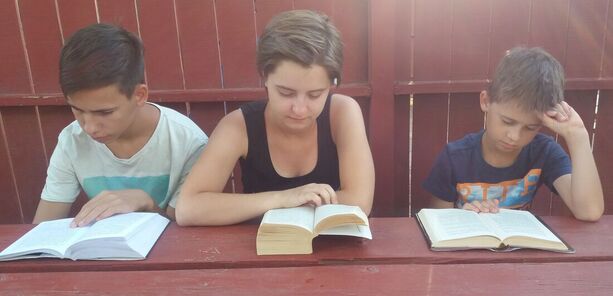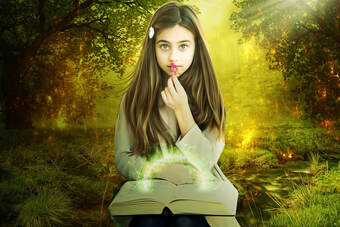|
The second book of the saga is the story of Kim Hana and her daughter Yoon Sori, with the action moving mostly between Warsaw and Cracow.
Summer is upon us, and the weather's turned scorching hot for the last few days, but it's early spring in the novel, so I'm experiencing a little dissonance each time I put away my laptop. I guess all authors spend their life with one foot in the fictional world. Is the violin really playing? Or is it the echo of the story again?
0 Comments
Reading books is not only fun, it's also one of the best ways to develop one's language skills. I tend to drone on about it to anybody willing to listen, especially to the parents of my students, and then, inevitably, I get asked this eternal question. How to persuade children to read books?
The answer is painful. Not because it is so difficult, no. But there are two conditions, and in most cases when parents hear them, I can see the answer on their faces right away: "Not going to happen." Condition one: they need to read books themselves, regularly. "But we don't have time for reading. We are so busy." Well, children are busy, too. There are so many things, school, friends, the Internet, homework, computer games, after-school classes, Netflix. If the adults demonstrate every day that reading isn't important enough to find time for it, children won't bother either. Why would they? Condition two: all those wonderful electronic distractions (I'm not being sarcastic here - they are wonderful, and I'm quite fond of them) need to get switched off for some time. Books are low profile entertainment, and they seem unattractive at first in comparison with all the flashier options. It takes a little time for children to start appreciating them, but once they do, you can usually switch all electronics back on quite safely. The kids have been hooked. Do you agree with my opinion? Have you discovered a better way? Let me know! Book blogger Ashley Hasty asked me some interesting questions. I had a lot of fun answering them!
Check out the interview on Ashley's blog: When I was very young, I wanted to be a boy. In all the books I read and all the films I watched, boys had such interesting lives, much better than girls. They had adventures, they fought, they changed the world, they protected their beloved. And the girls? Well. They mostly stayed loved and protected, while watching the boys do all those fantastic things. Now don't get me wrong. I adore a good male hero loving and protecting his girl; anybody who read The Trouble with Belonging will have no doubts about it. But why couldn't those girls have some adventures, too? It was so unfair. (Here I have to pay homage to great Astrid Lindgren and her unforgettable Pippi. They saved my self-esteem as a child and helped me make peace with my gender.) When my daughter was little, something started to change. We both watched Mulan a hundred times at least, and stories with enterprising, spiny, smart heroines popped up on bookstore shelves and on the screen one after another. But they all still carried this note of amazement: look, a girl, and she did THAT! Which basically meant that it wasn't normal, nor really recommended for ordinary girls to be so... unfeminine? But then girls and young women grabbed at the pens and keyboards themselves, en masse, and started creating their own stories with kick-ass heroines, badass heroines, rebel heroines, genius-girl heroines etc. And now the youngest generation reads these books and treats them already as the classic canon. Isn't it marvelous? I have no illusions. There are still enormous areas of our globe where girls are discouraged or even forbidden from having their own life and their own opinions. It happens on everyday basis even in the developed, allegedly modern societies. But.
I am a binge person.
I won't start watching a drama series which is not finished. Waiting a week for another episode would drive me crazy. I binge watch, just as I binge read (though never both during the same stretch of time), and then walk around bleary-eyed and cranky from too little sleep because unfortunately, it is impossible to speed up the process and watch faster. Film series are in this aspect much less binge-friendly than books.  And when I started writing The Trouble with Belonging, it was a good few months of writing and hardly anything else. No reading. No watching. No playing. No talking. No surfing the Internet, save the research for the book. I was a writing monk. I used to wonder if other people are like that, too. Now I know that most are not, and it's easy to recognize another binge person. They are those irritating weirdos obsessed with something they are doing at the moment to such a degree that they can hardly pay attention to anything else, and you can see how they struggle and have to make an effort to stay tuned to the normal life around them.
If you feel sorry for them, don't. There's a big chance they are actually quite happy in their madness. Mmm, science fiction books. Not everybody's cup of tea, I know. But I like.
I have a soft spot for those SF novels and short stories which focus less on the marvels of the futuristic technology and more on the social issues. Though there must be a little bit of technobabble included, or it wouldn't be really SF, I guess. Some SF books ask such astute and profound questions about the future of out planet and our human society that I sometimes think they should be made an obligatory read for all politicians and lawmakers, and perhaps for high school students, too. And some other books are pure fun and a pleasure to read, and that's scientifically fantastic, too. So here they are, a handful of my favorite SF books from different periods and parts of the world. |
|






 RSS Feed
RSS Feed
